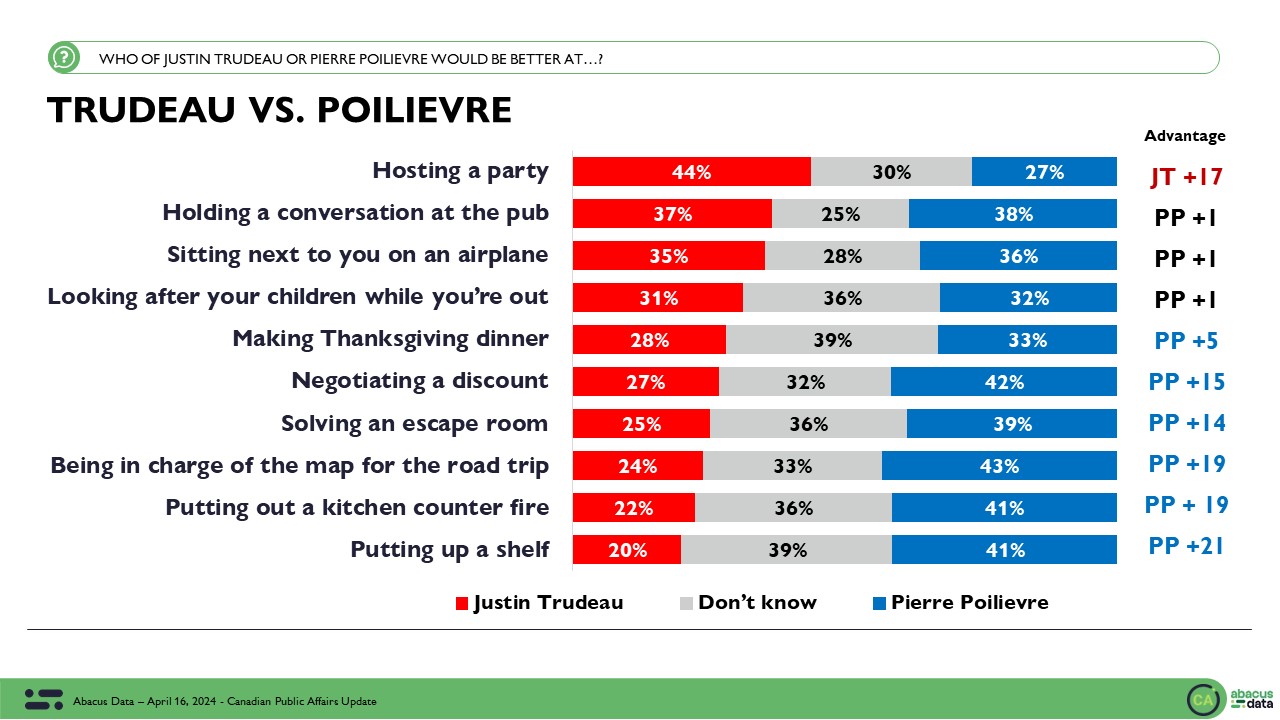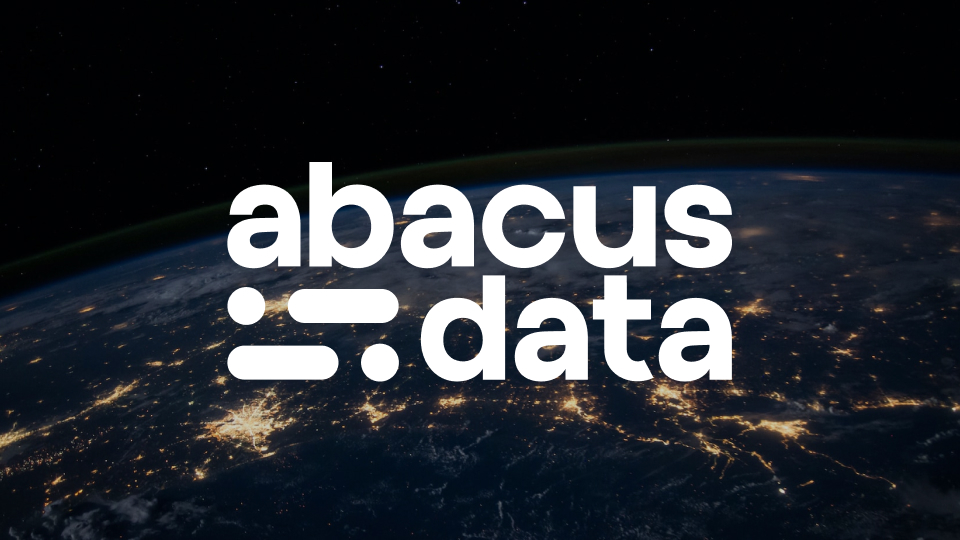Alberta Pulse: UCP leads over NDP thanks to a more united right
November 9, 2018
THE UNITED CONSERVATIVE PARTY LEADS THE NDP BY 15 AS 77% OF FORMER WILDROSE AND PC PARTY SUPPORTERS NOW SUPPORT THE UCP.
About three and a half years ago, the NDP surprised many in Alberta and across the country by winning a majority government in a province that had never elected the NDP and had been governed by the Progressive Conservative Party for 44 years.
With about six months to go before the start of the next provincial election in Alberta, we surveyed 800 Albertans at the end of October and asked them to share their views on politics in the province.
Here’s what we found:
THE UNITED CONSERVATIVE PARTY LEADS BY 15 AMONG COMMITTED VOTERS BUT 26% OF ALBERTANS SAY THEY ARE UNDECIDED.
If an election was held at the time of the survey, the United Conservative Party would likely win a majority. Overall 48% of committed voters say they would vote UCP with the incumbent NDP behind 15 points at 33%. The Alberta Liberal and Alberta parties both got 8% of the vote.
Among all respondents, 26% say they are undecided with most of those them saying they voted in the previous provincial election.

Compared to the actual election results in 2015, the NDP is down 7 points from the 40% it won, whereas the United Conservative Party is 3 points ahead of where the former PC and Wildrose parties stood if you combined their popular vote today.
The UCP leads among both younger and older Albertans (although the race is closer among those under 45) and among both men and women.

Whereas the UCP has large leads among Albertans with high school or college educations, they are tied with the NDP among those who have a university education.

Regionally, the NDP leads by 8 in Edmonton while the UCP has a 21-point lead in Calgary and a 42-point lead in communities outside of the two largest cities. The NDP is stronger among voters who say they live in an urban community (trail the UCP by 4) compared with those living in suburban or rural communities. In rural Alberta, the UCP has an astounding 44-point lead over the NDP.

Beyond the horserace, the situation is challenging for the NDP because of the limited size of its accessible voter pool.
The NDP’s accessible voter pool is 13-points smaller than that of the UCP meaning that even if the NDP converted all of its potential support into voters and mobilized them to vote, the UCP could still win if it holds onto most of its current support.
Moreover, the NDP must also deal with opponents closer to it ideologically in the form of the Liberal and Alberta parties who themselves have sizeable accessible voter pools to try and convert. In fact, as many Albertans say they are open to voting for Stephen Mandel and the Alberta Party as are those open to voting NDP.

THE NDP STRUGGLES HAVE MORE TO DO WITH A UNITED OPPONENT THAN DISSATISFACTION AMONG ITS VOTERS.
The NDP won in 2015 in large part thanks to a strong desire for change and a fractured conservative movement. Despite challenging economic conditions, the NDP government’s greatest threat is not from dissatisfaction with its performance among its past voters, but from a united opposition.
For example, among those who voted NDP in 2015, only 16% say the government has performed worse than they would have expected. 60% of PC or Wildrose voters feel the same way but on the other hand, 33% of NDP voters want a change in government, as do 66% of Albertans overall.
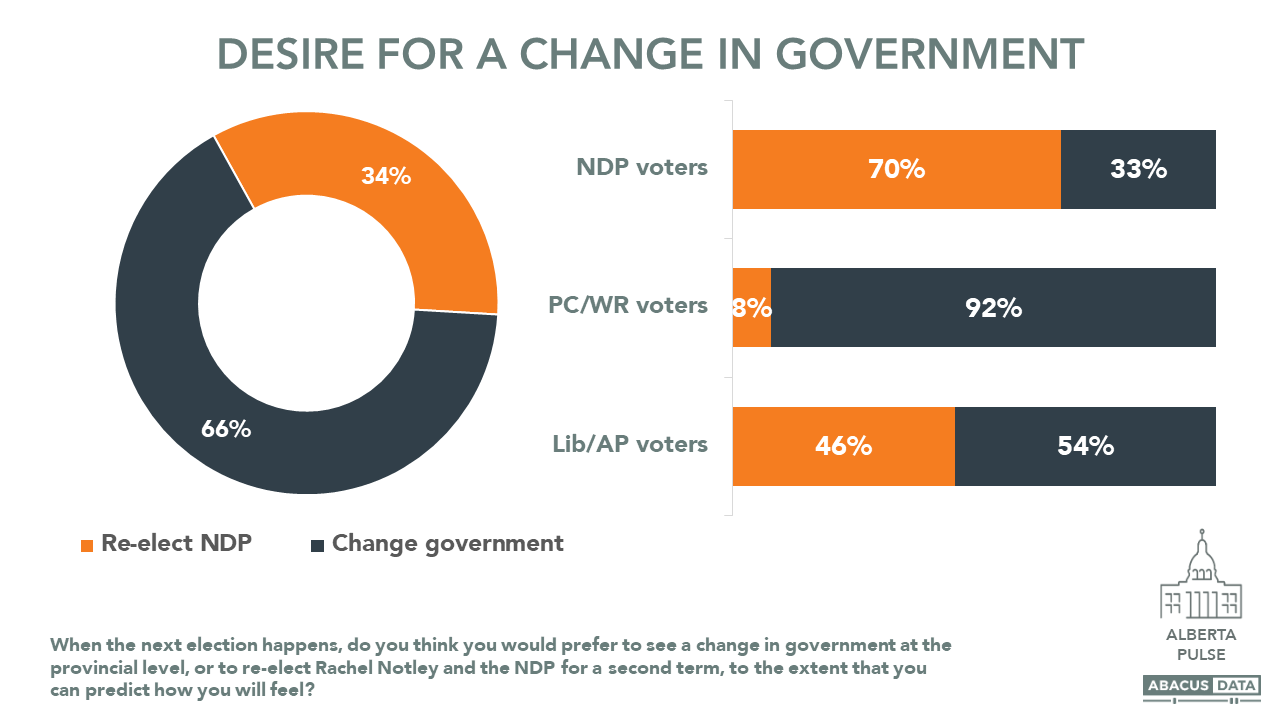
And while only 59% of those who voted NDP in 2015 say they would vote NDP again today, most of the defectors have not switched their support to another party, but instead, say they are undecided. 9% of past NDP voters now way they will vote UCP while another 10% are inclined to support another party (Liberal or Alberta Party). The NDP has an opportunity to rebuild its coalition from 2015 by convincing past voters that it deserves re-election and it is a better choice than its opposition. But that alone may not be enough to win again.

The reason? Because so far, the right in Alberta has reunited.
When we look at where 2015 Wildrose and PC voters have shifted, we find that 3 in 4 now say they would vote UCP. Another 13% are undecided while 10% say they would vote for another party (half of whom would vote NDP today). A united right along with some defection from the NDP to the UCP is the basis for the official opposition’s large lead in vote intention.

But several other factors can offer some insight into the dynamics at play in Alberta politics.
MORE HAVE A NEGATIVE IMPRESSION OF PREMIER NOTLEY THAN A POSITIVE ONE, BUT JASON KENNEY IS NOT FARING THAT MUCH BETTER.
Despite clear animosity towards Premier Notley, her personal numbers are nowhere near the level of negativity we have seen for other recent incumbent premiers facing re-election in Ontario or Quebec. One in three Albertans has a positive view of the Premier compared with 45% who view her negatively.

About the same number have a positive view of Jason Kenney but his negatives are 11-points lower.
David Khan and Stephen Mandel are less well known and not well defined, except in Edmonton where Mandel, as the former Mayor, is better known.
Impressions of Premier Notley match closely with vote intention patterns. She’s more popular in Edmonton and much less so in Calgary and areas outside the two major cities. Interestingly, men view her more positively than women.
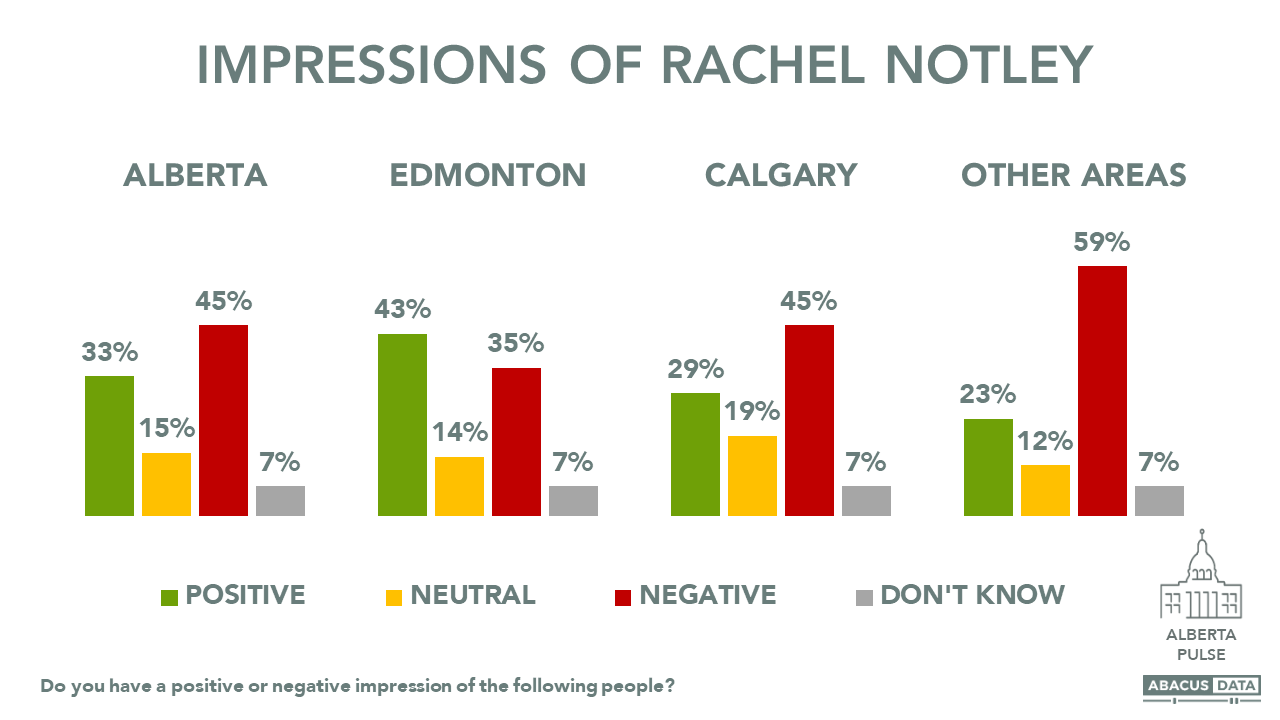
Among 2015 NDP voters she is well liked (only 15% view her negatively) while PC and Wildrose voters overwhelmingly dislike her (9% disagree and have come to like the NDP leader). More important, however, among Liberal and Alberta Party voters, half have a positive view of the NDP premier suggesting an opportunity to grow support among those voters.

Impressions of UCP Leader Jason Kenney also follow similar patterns as vote intention. He is more popular in Calgary and outside the big cities and more unpopular in Edmonton. Men and older residents have a more favourable impression of him while women and younger resident feel less positive about him.

As expected, there is a strong relationship between how one feels about Premier Notley or Jason Kenney and the likelihood of supporting the party they lead. Among those who like Rachel Notley, 65% say they would vote NDP. That number drops to 11% among those who are neutral towards her and 1% among those who dislike her.
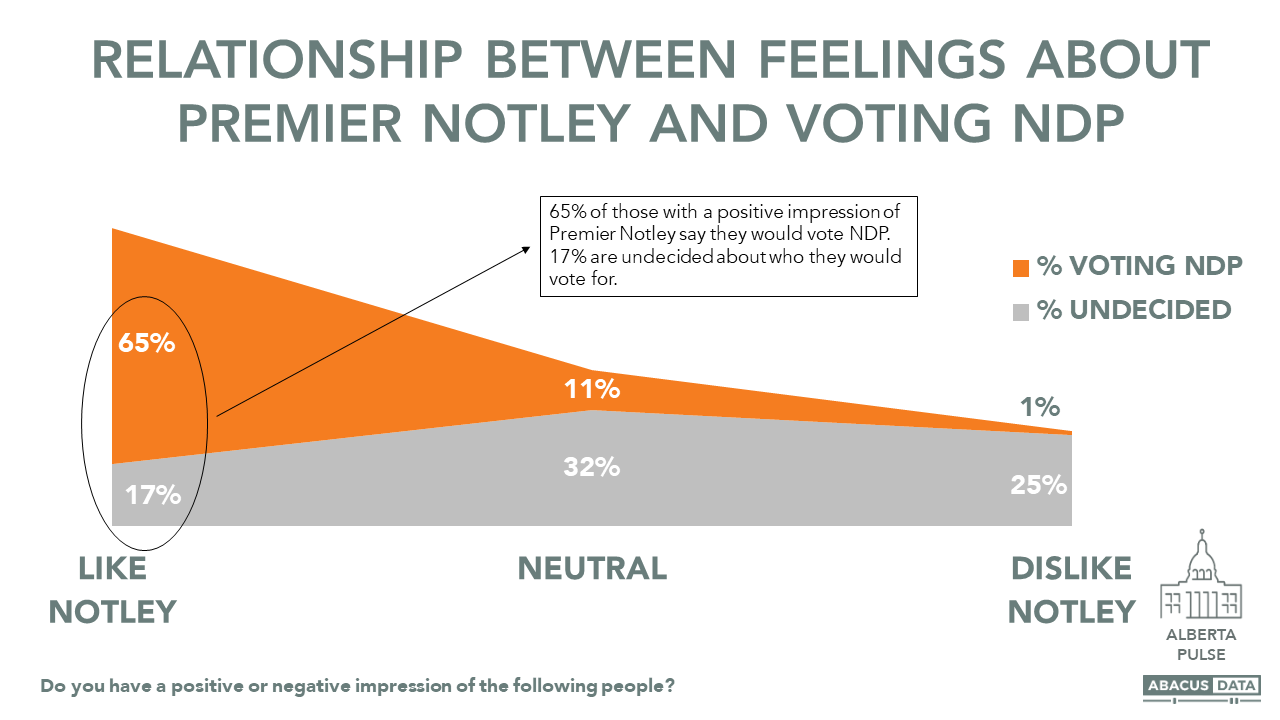
For Mr. Kenney, 87% of those who like him would vote UCP compared with 28% of those with more neutral feelings and 3% of those who dislike him. This advantage among those with “neutral” views is both an opportunity for the UCP and a potential threat.

PREMIER NOTLEY AND HER GOVERNMENT GET GOOD MARKS FOR STANDING UP FOR THE ENERGY SECTOR AND RUNNING PUBLIC SERVICES BUT STRUGGLES ON ECONOMIC AND BUDGET MANAGEMENT.
When we ask respondents to rate the performance of the provincial government in a few areas, we find residents do hold different views depending on the issue. For example, about half of residents feel the government has done a good job standing up for Alberta on the pipeline flight or standing up for the energy industry. About half think the government has done a good job running the province’s public services.
But on questions of economic and fiscal management, less than four in ten feel the government has done a good job with at least 3 in 10 feeling the government has done a very poor job. This helps explain Jason Kenney’s focus on economic development and fiscal management as it appears to be a major vulnerability for the government.

Broader perceptions about the state of the Alberta economy underscore this challenge. Most Albertans (56%) describe the provincial economy as poor or very poor. Another 5% describe it as very good and 39% say it is good.
When we ask about how things are going in other provinces and nationally, we find that Albertans are less bullish on the Canadian economy but generally feel that things are better in Ontario, BC, and especially neighbouring Saskatchewan where 62% describe the Saskatchewan economy as doing very good or good – 18 points fewer than think the same thing about the Alberta economy.
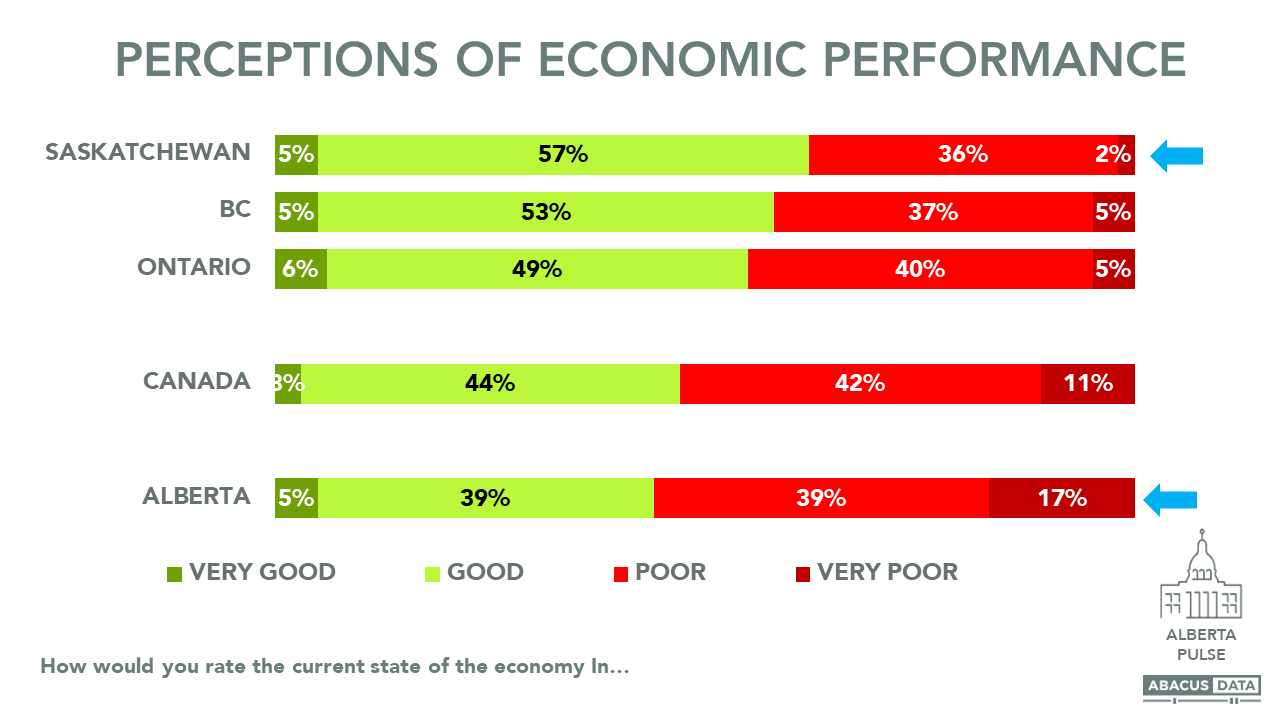
When we look specifically at perceptions of the Alberta and Saskatchewan economies, we find that 29% of Albertans feel the Alberta economy is doing poorly but feel the Saskatchewan one is doing well. This group holds quite negative views of the NDP government. Only 9% think the government is doing a good job managing the economy and only 12% voted NDP in 2015.
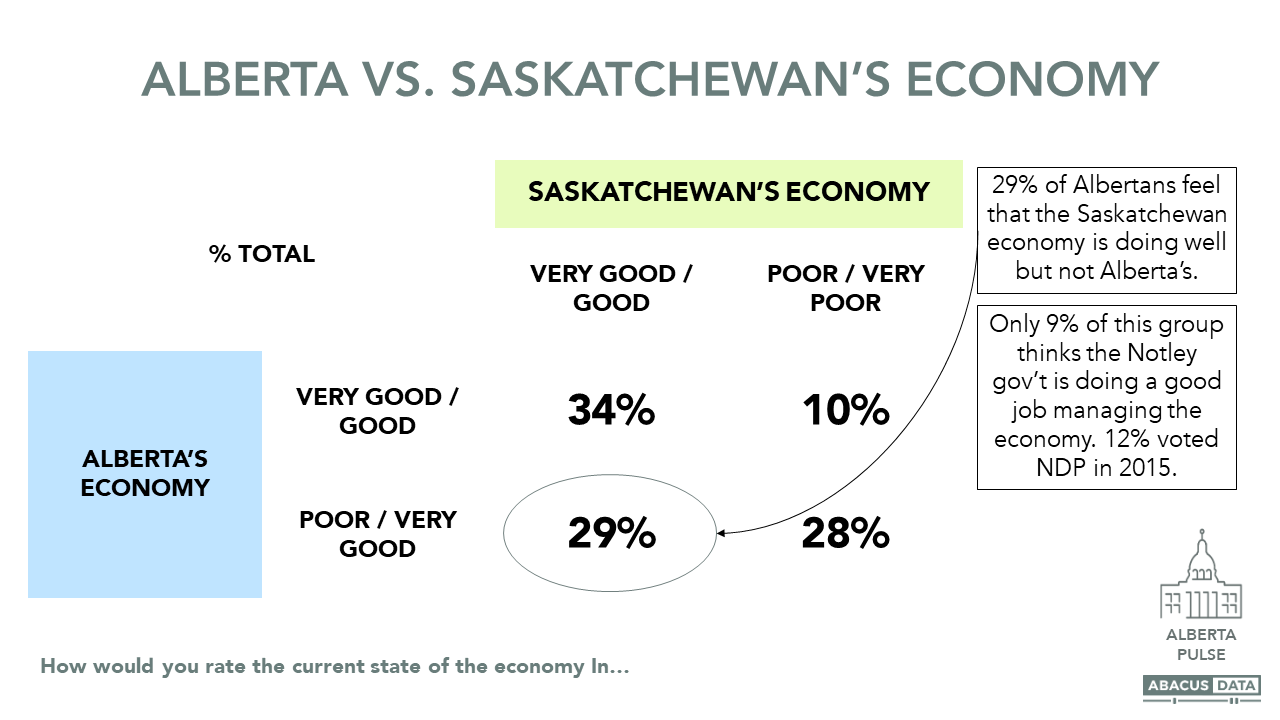
This difference in perceptions between how the economy is doing at home and across the provincial border in Saskatchewan is interesting and may be driving some of the underlying negativity towards the NDP government despite that fact that Alberta and Saskatchewan have similar unemployment rates and in 2017 and 2018, Alberta’s economy has grown at a faster rate than that of Saskatchewan.
UPSHOT
With about 7 months to go before the next Alberta election, the opinion environment for the NDP and Premier Rachel Notley is quite challenging. Two-thirds of Albertans want change, conservative-oriented voters have rallied and mostly united around Jason Kenney and the United Conservative Party, and despite some goodwill for Premier Notley, the smaller pool of accessible voters for the NDP means it has much less room for error and fewer paths to victory.
The UCP is in a strong position thanks to its effectiveness at uniting former PC and Wildrose party supporters. With a 15-point lead in vote intentions, a 13-point advantage in terms of accessible voters, and broad and deep support outside of Edmonton, the UCP is well positioned to win come next spring.
But a few data points suggest it’s still too early to call it for the UCP.
First, one in four Albertans are undecided and a majority of those undecided respondents said they voted in the previous election. Many are former NDP supporters who are somewhat disappointed with the government but are not fully comfortable with alternatives.
Second, compared with other premiers and provincial governments that have been defeated over the past year, Rachel Notley is more popular and the desire for change is not as intense as with those other cases. Albertans do give her credit for standing up for the province in the pipeline debate and recognize her efforts standing up for the energy industry. If the economic situation in the province and provincial finances continue to improve there may be space for an NDP comeback.
However, one challenge stands in the NDP’s way – the UCP and Jason Kenney. As long as conservative-oriented voters are united behind Jason Kenney and the UCP, even with all those who voted NDP back under the orange tent, the UCP would likely still win.
METHODOLOGY
Our survey was conducted online with 800 Albertans aged 18 and over from October 24 to 27, 2018. A random sample of panelists was invited to complete the survey from a set of partner panels based on the Lucid exchange platform. These partners are double opt-in survey panels, blended to manage out potential skews in the data from a single source.
The margin of error for a comparable probability-based random sample of the same size is +/- 3.5%, 19 times out of 20. The data were weighted according to census data to ensure that the sample matched Alberta’s population according to age, gender, educational attainment, and region. Totals may not add up to 100 due to rounding.
ABOUT ABACUS DATA
We are the only research and strategy firm that helps organizations respond to the unprecedented threat of generational change and technological disruption.
We are an innovative, fast-growing public opinion and marketing research consultancy. We use the latest technology, sound science, and deep experience to generate top-flight research-based advice to our clients. We offer global research capacity with a strong focus on customer service, attention to detail and exceptional value.
Contact us with any questions.
Find out more about how we can help your organization by downloading our corporate profile and service offering.


